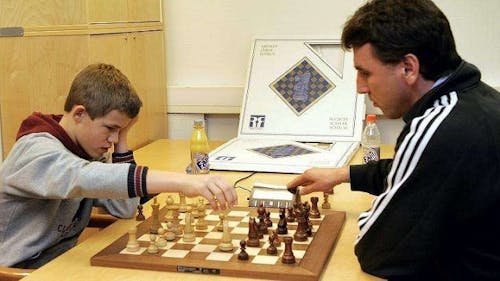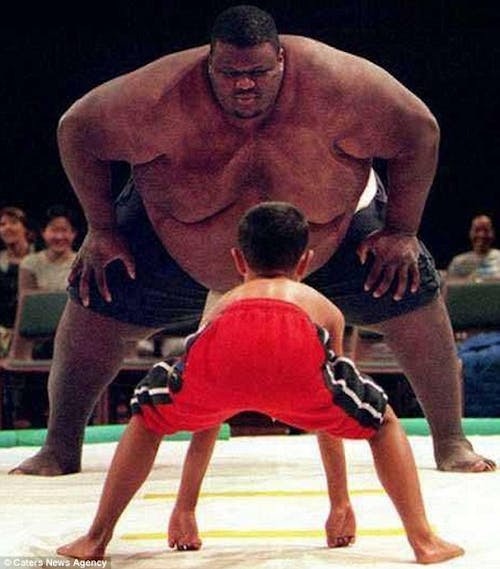Are you sure you want to delete your account?
(This will permanently delete all of your data - purchases, game scores, ratings, etc)
Change your username
Your current username is: guest
Change your account email address
Your current account email is:
Redeem your Fampay code here!
Use your Fampay code to get access to the Play Magnus Plus Membership!

How to Play Against Much Weaker Opponents?
This column is a logical follow-up to the post "How to Play Against Much Stronger Opponents?"
Indeed, in chess, you can be a David one day and a Goliath on the other!
You may want to check out the article mentioned above to learn what to expect from a well-prepared opponent. Still, how do you maximize your chances if you are rated significantly higher?
Forget about ratings
Don’t dwell on the potential minuscule rating gains or huge losses. Just focus on the game itself and enjoy the process of playing and fighting for a win.
Avoid complaining about underrated opponents. Of course, some bright juniors out there are much stronger already than their ratings suggest. Also, occasionally in open events, you get paired against adults who are having the tournament of their life. Still, in the long run, things even out. When you beat an overrated guy who has a bad day on top of that, you probably mark it as a personal achievement and don’t whine about the circumstances that were in your favor!
Don’t underestimate the opponent
Doing so is particularly important when opposing junior players who are quickly rising through the ranks. Anyway, regardless of whom you are facing, you should treat all your opponents with due respect.
Suppose you have a problem taking lower-rated players seriously. In that case, you may want to reverse the tip we offered to Davids: instead of looking at the most humiliating losses, review your opponent’s best games! It may turn out that on a good day, he is no pushover and that he had dispatched higher-rated players than you before.
Expect an interesting encounter
It is a common sin to adopt a “professor” approach to such games, expecting the “student” for an exam and not being particularly thrilled about the whole process. Remember that sometimes games against incredible players fizzle out into dull draws, while some match-ups against underdogs end up being nail-biting thrillers! In other words, don’t become upset in advance by expecting to waste your time playing a silly game.
Be careful when it comes to opening discussions
The situation with openings is somewhat tricky.
On the one hand, if you realize that your opponent doesn’t work on chess much and probably can’t tell Stockfish from Leela, it makes sense to capitalize on his weak spot and catch him off-guard in the opening.
On the other hand, what should you do if you realize that your opponent is a reasonably decent theoretician? Or, even worse, he has a professional coach assisting him? Then it is probably better to stay away from sharp, forcing opening lines. The point is that modern engines play at roughly Elo 3500 level, so even a much lower-rated player can gain a huge advantage if he manages to outprepare you. Since you are the stronger player in practice, it is better to stay away from heated theoretical discussions that can go either way.
Do not push too hard
Of course, weak players do tend to fall apart under pressure. However, unless you naturally play like young Tal, it usually doesn’t make sense to go all-out against a lower-rated opponent. In fact, with their backs against the wall, some of them are capable of finding the only defenses and landing devastating counterpunches on the unsuspecting bullies. Avoid this highly unpleasant scenario: launching an unjustified attack, seeing it refuted, spending a lot of time to come up with some tricks, falling into a bad mood because of your poor decisions, winding up in time trouble, and losing.
Instead, stay calm and confident and play regular, solid chess. Weak players tend to self-destruct when you expect it the least: they miscalculate things, go for tactics that work out in the opponent’s favor, execute faulty plans, create weaknesses in their camp, transpose into inferior endgames for no reason, and so on. All you have to do is give them some time and room for displaying their abilities! 😁 If the game is long and complicated enough, they will probably find a few chances to go wrong, especially if you give them a choice.
Don’t play for cheap traps
The title of the paragraph is yet another reminder not to underestimate your opponent. Quite often, Goliaths lose by playing for silly traps which they would never fall for themselves. The underlying assumption in their heads is that their opponents are such patzers that they won’t be able to calculate anything at all! If the trap is natural and you would use it against a stronger opponent, go for it. However, it is better not to play for cheap tricks, worsening your position this way just for the sake of giving your opponent a little chance to go astray.
Additional tips on how to handle the game
Unless you are a highly versatile player who can switch between different playing styles quite efficiently, it makes sense to play normally. Nevertheless, it is still useful to keep a few tips in mind when navigating the game.
On average, amateurs are more excited about tactics than strategy. You can expect them to solve puzzles as part of their chess training and go over masterpieces created by the world’s finest players. As a result, their attacking skills may be far superior to everything else they know about chess. Pay extra attention to king safety. Closed structures are usually a better choice than open battles when both sides throw their shields aside and go all-out on each other.
The less experienced a player is, the more helpless he usually is in the endgame. That’s why one of the well-known chess tips is to go straight for the endgame when facing kids who have a sharp eye for tactics. Naturally, this rule of thumb applies to adult players as well; what matters is the difference in playing class/experience.
Good luck and have fun facing underdogs over the board!

